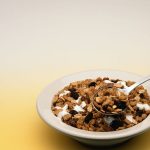
Asparagus is a great spring vegetable that can be a tasty side dish or the starring ingredient in a main course like risotto. And it’s more than just delicious — asparagus is great for digestive health, too. It’s a prebiotic food, meaning it feeds the helpful bacteria that live in your gut. These good bacteria are responsible for everything from signaling your immune system and keeping digestion in check to producing vital B vitamins. When shopping for asparagus, look for spears that are free of blemishes and dry spots, and tips that are closed and firm. Use asparagus promptly — it can spoil quickly. Miso asparagus is an easy side dish that can also be enjoyed as a main dish when served over salad or with sliced chicken. Miso is a paste made from fermented soybeans. It’s a probiotic food, which has similar health benefits. Though it has a high salt content, it’s typically used in small amounts. Find it at health food and Asian food stores as well as in the Asian food aisle of large supermarkets. Miso Asparagus 1 pound green asparagus, trimmed 2 tablespoons sesame oil 1 tablespoon miso paste 1 tablespoon ginger, minced 2 garlic cloves, minced 2 tablespoons water Warm a large skillet over medium heat. Heat the sesame oil, and then add the asparagus. Cook, covered, 4 to 5… read on >

















